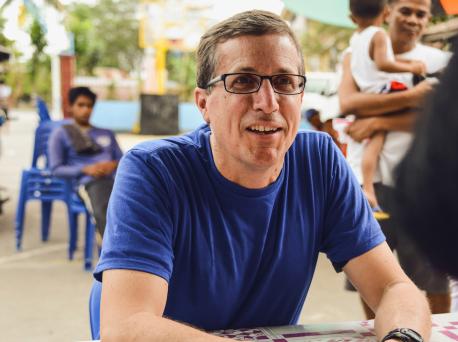
UNICEF USA's New CEO on Creating Real, Positive Change for Children
No stranger to public health emergencies and humanitarian response, Michael Nyenhuis began his tenure as UNICEF USA's CEO on March 30 in the early days of New York City's lockdown, just as the world's timeline was being sharply divided by the COVID-19 pandemic. Below, Nyenhuis reflects on his 25-year career in global health nonprofits and UNICEF's unparalleled capacity to improve the lives of the world's children.
What draws you to humanitarian work?
MICHAEL NYENHUIS: Two things have drawn me to humanitarian work over the past 25 years. First, as global citizens, we have a responsibility to reach out to the most vulnerable in our world. Second, I've seen the results of this work. Children do get healthier when we invest in them, families do have brighter futures with our support. I've seen this firsthand.
As global citizens, we have a responsibility to reach out to the most vulnerable in our world.
What influences how you lead?
Every time I meet a front-line aid worker, a doctor giving vaccinations to children, a nurse teaching nutrition and hygiene to families, an agriculture expert working with smallholder farmers to improve crop yields, I'm inspired. They're on the front lines; our job is to serve them.
Is leading UNICEF USA different?
The key thing that drew me to UNICEF USA was a connection to the global platform of UNICEF. At UNICEF USA, we're a critical part of an ecosystem of committed people in 190 countries creating real, positive change for children, especially the most vulnerable.
Why is racial justice so important to you and to UNICEF?
MICHAEL NYENHUIS: I wanted to publicly reaffirm our commitment to racial justice for our employees, our partners, and Black and brown communities everywhere. We are deeply concerned about the impact on children of color. On top of the COVID pandemic, which has already disproportionately impacted families of color, children are the silent victims in both of these crises. When we say Black Lives Matter, we also need the lives, futures and safety of black children to matter to all of us. I grew up near Minneapolis, so the pain that community is facing is personal to me.
I've spent 25 years working in and leading global nonprofits focused on health, so our response to this pandemic is right in my wheelhouse.
How have you prepared for a global public health crisis?
MICHAEL NYENHUIS: I've spent 25 years working in and leading global nonprofits focused on health, so our response to this pandemic is right in my wheelhouse. Children and families need good health to make progress in their lives. It's one of those gating issues. With good health, people have opportunity. Poor health, disease and the threat of pandemics put all of that in jeopardy.
You led during the Ebola epidemic. What translates to the coronavirus response?
MICHAEL NYENHUIS: What worked best in West Africa was a committed and coordinated international response — we recognized we were all threatened, and we're all in this together— a competent response by the national governments most affected, and most important of all, behavior change on the part of a public that took the threat seriously.
There is no better platform in the world than UNICEF to fight disease, combat poverty and build hope and opportunity for children and their families.
How can UNICEF help fight COVID-19?
MICHAEL NYENHUIS: There is no better platform in the world than UNICEF to fight disease, combat poverty and build hope and opportunity for children and their families. We're in 190 countries with 13,000 staff and many, many partners. Our job here at UNICEF USA is to rally the American public to support that mission. We won't stop. We'll do whatever it takes to save the lives of children, protect them and help them thrive.
Your generous contribution will help UNICEF be there for children and families around the world.
Top photo: UNICEF USA CEO Michael Nyenhuis is working to bring real change to the world's children and their families, especially the most vulnerable. © UNICEF
HOW TO HELP
There are many ways to make a difference
War, famine, poverty, natural disasters — threats to the world's children keep coming. But UNICEF won't stop working to keep children healthy and safe.
UNICEF works in over 190 countries and territories — more places than any other children's organization. UNICEF has the world's largest humanitarian warehouse and, when disaster strikes, can get supplies almost anywhere within 72 hours. Constantly innovating, always advocating for a better world for children, UNICEF works to ensure that every child can grow up healthy, educated, protected and respected.
Would you like to help give all children the opportunity to reach their full potential? There are many ways to get involved.



